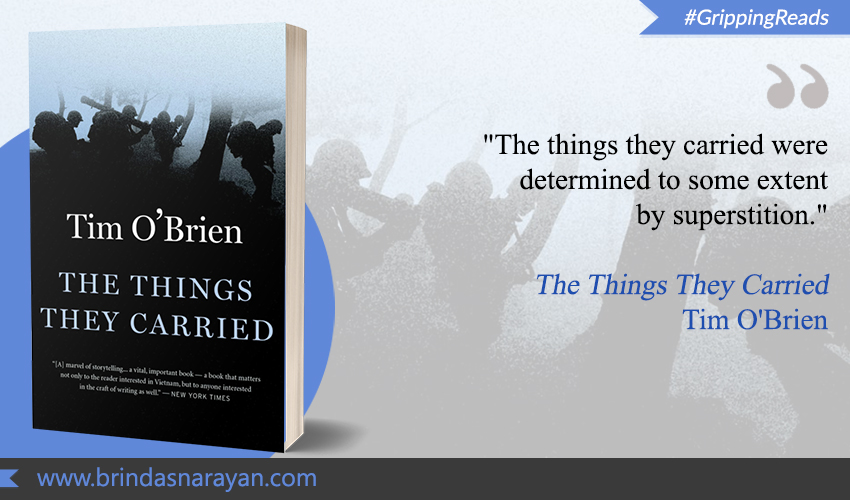
Tim O’Brien’s Soldierly Reflections on the Vietnam War
When I first read Tim O’Brien’s novel-in-stories, The Things They Carried, I felt like I had been socked in the gut. His descriptions of soldierly feelings – the fatigue, the emotional depletion, the nostalgia, the terror and stultifying numbness – seemed to carry us right into the trenches of Vietnam. O’Brien himself had signed up, like many others in his generation, for a war that seemed senseless. Perhaps like all wars are for those in the midst of flaming shrapnel and mutilated bodies.
Human beings carry baggage in some form or the other. To soldiers detonating shadowy figures, napalming living villages or darting between rocks and bushes, such burdens are magnified. The memories and regrets, the hopes and whispered prayers start accumulating a tangible heft, with emotional aches seeping into physical sensations, even as they try to obliterate their entanglement from a situation that’s not of their choosing.
“First Lieutenant Jimmy Cross carried letters from a girl named Martha, a junior at Mount Sebastian College in New Jersey.”
Sometimes they carry abstractions, or even delusions. Like Jimmy Cross who wonders if someone who signs off, “Love, Martha” actually means it. Or is merely being polite, tossing the word in, as most of us do, like a customary ciao or ta-ta. In a setting, where one might encounter death at any point, or even worse, be compelled to kill, everything is flippant. Or nothing is.
They also carry real things. Tedious things, that O’Brien carefully and aggravatingly lists out, without sparing the reader. The point is to draw our attention to the sheer futility of stuff, as well as the soldier’s real or imagined dependence on “necessities or near-necessities.” All of which become weights on their backs, things like “P-38 can openers, pocket knives, heat tabs, wristwatches, dog tags, mosquito repellents, chewing gum, candy, cigarettes, salt tablets…” The mundane stuff is lugged with not-so-mundane weapons: grenade launchers, assault rifles, guns, handguns, bayonets.
“Until he was shot, Ted Lavender carried 6 or 7 ounces of premium dope.”
Some soldiers carry their addictions. It’s the only way they can make it through a terrain that is already littered with defeat or pointless victories. Along with fear, they lug their guilt. O’Brien, who wrote this book twenty years after he had returned from the war, acknowledges that fear made him sign up. He had initially wanted to move to Canada, to avoid being drafted.
He could have escaped, he could have remained a conscientious objector. But as a writer, who is unflinchingly honest about his emotions, he said he signed up because he was afraid. He was scared of being laughed at or ridiculed. He was scared of being dismissed by patriots, scared of being called a wimp. It wasn’t courage that took him there, but the opposite. Except, ironically, one wonders if any soldier can honestly claim to have killed without fear. Or regret. Or the burdensome guilt that one might ferry back, of lives shortened or irrevocably scarred.
“Norman Bowker carried a diary. Rat Kiley carried comic books.”
O’Brien himself is a character in the book. Who writes about his writing as a means to purge himself of memories. Or perhaps to reconnect with them. To use them, as one might with shards of a broken object, to evoke the past or reshape the future. While Tim is too deft a writer to offer up simple platitudes or morals, the takeaway for most readers is clear: war is never justified.
He pointedly does not name any Vietnamese “enemies” – after all, soldiers cannot carry on with impossible obligations if they hear the stories of those that they are killing. Fathers, lovers, teachers, artists or just ordinary blokes. People, whose humanity is not lesser or greater than of the young American adults who were roped in to destroy them.
And this was O’Brien’s point too: many of those soldiers were teenagers or just a few years older. They didn’t even know who they were as people, before they were flung into a conflict that they couldn’t understand. They were battling malaria, their unfamiliarity with a foreign terrain, their own feelings or ideologies, their disinterest in the outcome. The more significant battles were within themselves.
Ex-soldiers turned writers can be the world’s strongest advocates for peace.
References
Tim O’Brien, The Things They Carried, Broadway Books, 1990




